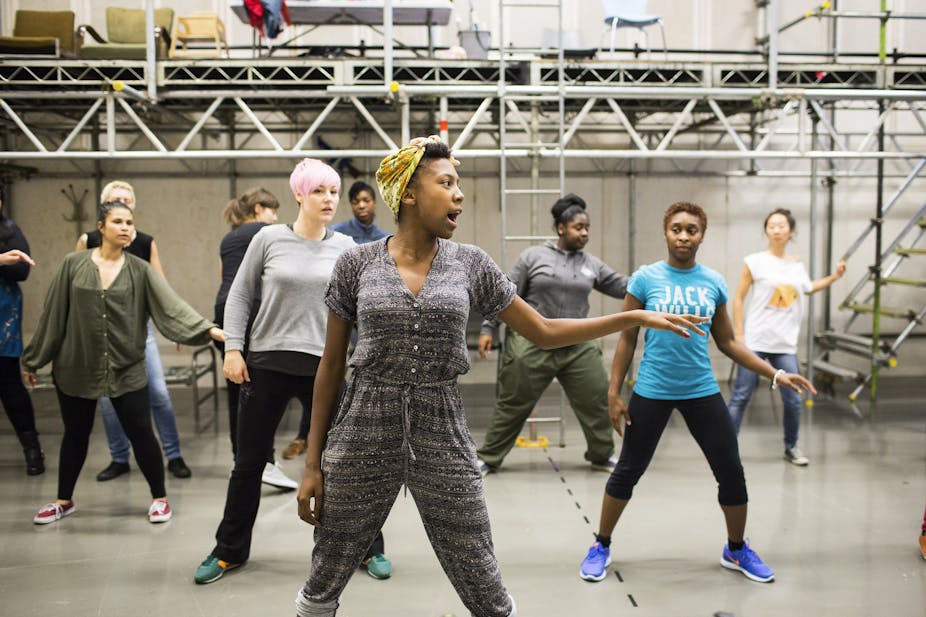Shakespeare’s King Henry IV recently opened at the Donmar. And it has a twist. Directed by Phyllida Lloyd and starring Harriet Walter as the king, the production follows Lloyd’s acclaimed Julius Caesar. Both are fully cast with women. They arise out of a collaboration with Clean Break Theatre, whose work with and on behalf of women prisoners is crucial in extending the role that theatre plays in contemporary society.
Such casting is becoming more familiar: Maxine Peake is currently continuing the great tradition of women playing Hamlet and Lisa Dillon’s Roaring Girl with the Royal Shakespeare Company triumphantly reprises a cross-dressing play from 1611. But casting an entirely female company for Shakespeare plays has inevitably attracted critical attention.
This is because it entirely breaks the connection between the actors and the roles. It challenges the convention that, for example, Falstaff should be played by a fat old man, rather than a young woman. And this does have the capacity to make an audience think harder about our expectations of Shakespeare and the diversity of the theatre in which we experience his work today.

There’s a long standing connection between Shakespeare and feminist ideas. The celebrated 19th-century actress Ellen Terry used her lectures on Shakespeare’s women and children to assimilate even the villainous characters into a model of Victorian family life. And the early 20th century suffragist Shakespearean Charlotte Stopes (mother of the birth control pioneer Marie Stopes) imagined a Lady Macbeth based on Gruoch, the historical Scottish queen who is “utterly unconscious that she is mentally so far (Macbeth’s) superior”. Such readings were certainly insightful, even beautiful, but it stopped there – there was no extrapolation of the text to make pertinent social comment.
Since the 1980s there has been a sharper and louder critique from women in the theatrical and the academic professions, impatient that admiration for Shakespeare’s heroines continues to obscure the limitations of their social lives, in and outside the plays. Clean Break theatre company is one manifestation of that active political engagement. It takes forward the tradition created by such ground-breaking women’s theatre companies as Monstrous Regiment and the Women’s Theatre Group, now playing as Sphinx Theatre Company. The scale of these companies and their commitment to new writing by women gives them a repertory that goes beyond Shakespeare. And as Sarah Werner has described, Shakespearean actresses took up the issues too, most notably in the 1985 campaign by the RSC Women’s Group to extend the range and style of the company’s performance in ways that paid more attention to women’s roles on and off the stage.
At the time, the RSC women’s group found the bastions of Shakespeare Theatre too well defended. Sarah Werner describes how Terry Hands, the then director, faced with a proposal for an all-women Macbeth, apparently could only stutter: “Well no. We, I mean, no. I, well, we, no. No, definitely not.” Too much was at stake, in financial, organisational and artistic terms, to risk that play being produced by a relatively inexperienced group of women.

Since then, of course, thanks to the energy and creativity of women, there has been some change. Women directors are creating the highlights of UK theatre in large-scale as well as small-scale shows and they are leading major companies in executive roles – think Josie Rourke, Vicki Heywood, Catherine Mallyon. Though the conditions of the profession mean that many women still, as one Women’s Theatre Group member complained in 1979, find themselves playing “a tart with a golden heart in a PVC skirt”, they are also creating the roles of Medea, Electra and, yes, Henry IV.
Their performances and productions are showing us that women’s theatrical creativity involves more than speaking what one critic has called Shakespeare’s “glowing poetry”. Instead, female actors use their creative imaginations to perform the full range of parts from the theatrical repertory of the world, just as Shakespeare’s boy players had to invent the roles of Cleopatra, or Doll Tearsheet.
In the process, they often show how women invent themselves in the social world too. Harriet Walter’s performance as Cleopatra, to take just one example, was a masterpiece of passion but also of artifice. She used her black wig as a tool with which to switch from the iconic image of the Egyptian queen – used to manage the men who both loved and hated her – and left it off in the scenes when she is with her women. It was a tiny but telling reminder of how human beings choose to make themselves – and the limits of the circumstances in which they can do so.
The history of women in the theatre has shown multiple occasions when women have done just that and the fact that it continues to surprise us shows how far the limits still remain. So we should expect no sudden turning points, but Phyllida Lloyd, Clean Break and their cast of women are taking another, significant, step along the way.

